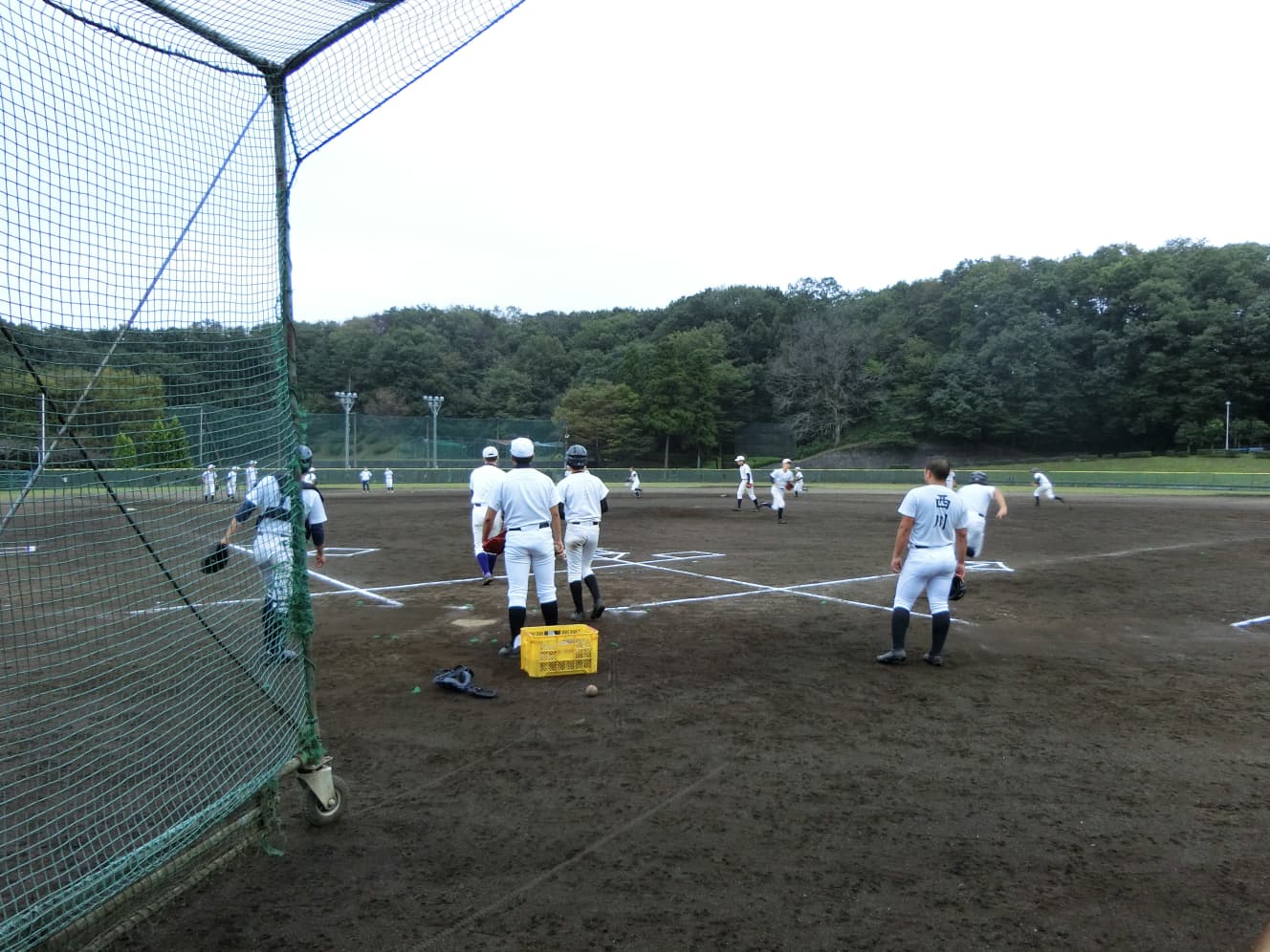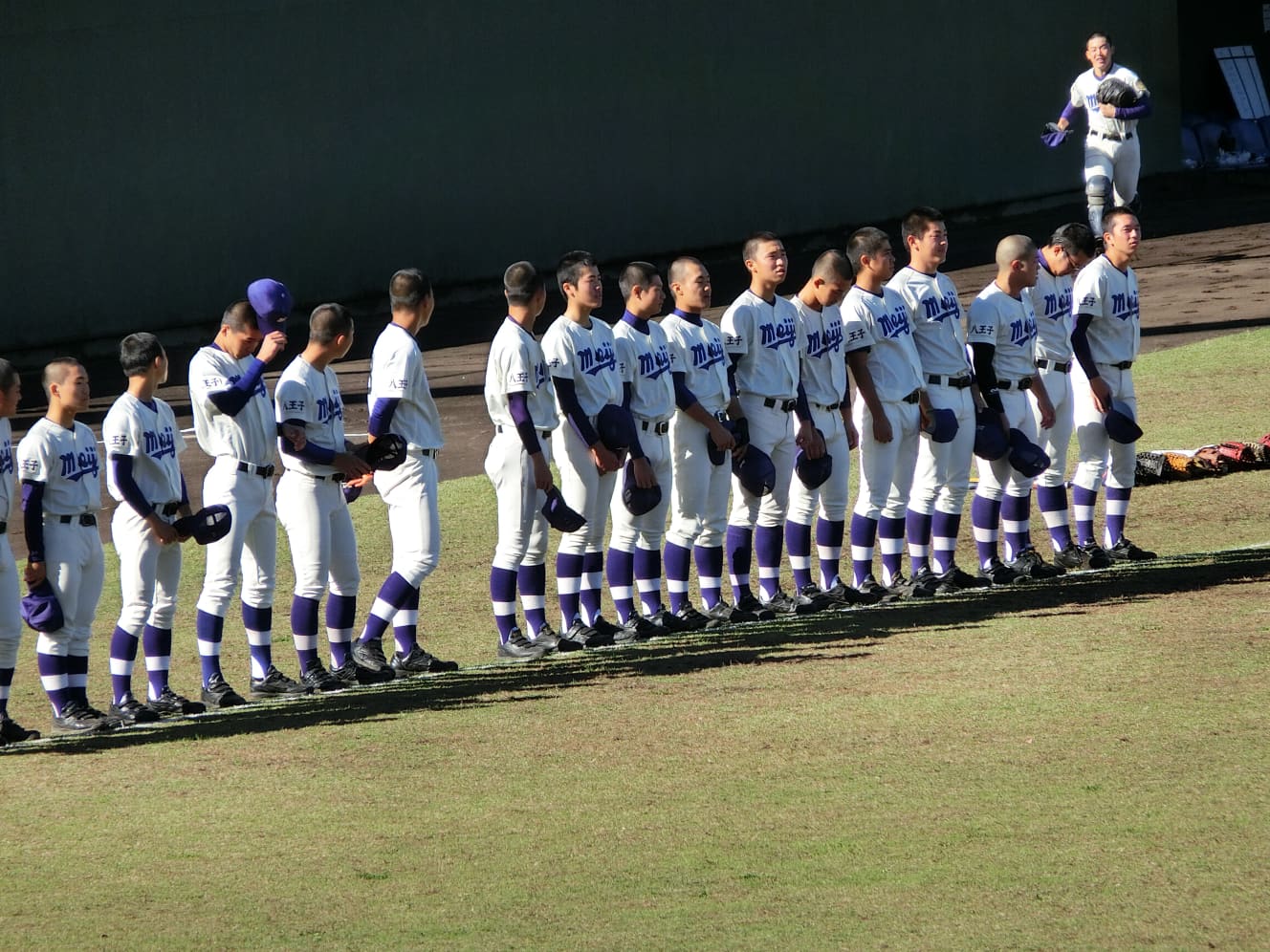Stay close! Meihachi, a Prep School with a Serious Aim for the Koshien Tournament, Takes on a Surprising Challenge
The Story of the Meihachi Baseball Club (1) "Uneasy Departure" from the Sacred Ground, Koshien, in the distance
He is one step short of his dream. Despite the restrictions placed on him by his school, which is one of the best preparatory schools in Tokyo, there is a man who still earnestly aims to make it to the Koshien National High School Baseball Championship. He is Takafumi Sugihara, manager of the Meio Nakano Hachioji Baseball Club. This 180-day documentary follows his struggles and anguish, and the physical and mental growth of his students.

Aiming for a long-sought first appearance in the tournament
On March 18, the 94th annual high school baseball tournament will open. Four of the 32 schools will compete on the dream stage for the first time. Excluding the three schools that qualify for the 21st Century Quota, which takes into account factors other than academic performance, Wakayama Higashi is the only school making its first appearance in the tournament, but coach Hisahide Yonehara has a track record of making it to the Koshien Tournament with another high school. The team has won a ticket to the sacred ground with the help of a famous coach who knows the Koshien experience.
Since 2000, a total of 1,042 high schools have participated in the National High School Baseball Championship Tournament, the so-called “Summer Koshien,” but only about 15% of them are making their first appearance. If we exclude schools that have participated in the Spring Senbatsu Tournament, even though it was their first time in the summer, and teams led by coaches with experience at other schools, the number of first-time entrants is only about 8%.
It is very difficult for a school with no experience in Koshien to go to the sacred ground under a coach with no experience in Koshien.
The best baseball players are attracted to schools and coaches who have a wealth of personal connections and experience, and they aim for the top. There is one coach who is seriously trying to break down this oligopolistic structure of the Koshien.
Known by the nickname “Meihachi,” he is Takafumi Sugihara of Meio Nakano Hachioji High School.
This is his seventh year in charge of the school. Every year, the school has made it to the top of the rankings, but it is still one step away.

Meihachi is a high school that excels academically with a deviation score of 69. Naturally, daily practice time is limited. In addition, the West Tokyo area, to which Meihachi belongs, is one of the most oligopolistic areas in Japan. Nichidai San, Waseda Jitsugyo, and Tokai University Sugo ……. Since 2000, there has only been one case of both school and leader making their first appearance in the tournament: Hachioji Gakuen Hachioji in 2016.
In such a tough environment, Sugihara is aiming for the Koshien.
Sugihara’s coaching is passionate and strict. However, the talented students with a deviation score of 69 have never woken up and are desperately trying their best to get to the top.
Why does Sugihara continue to take on difficult challenges? Why do these students, who would have a bright future even if they did not play baseball, work so hard?
This article follows the “reckless challenge from the side” of the Meihachi Baseball Club as the players grow up and seriously aim for the Summer Koshien Tournament in 2022.
Pursuing the True Monbushido (the Way of the Literary and Martial Arts)
It is around 5:50 p.m. on a weekday. The members of Meihachi’s baseball team had finished practice and were hurriedly getting ready to leave after preparing the field and cleaning up. It was 3:50 p.m. when classes ended. It had only been about an hour and a half since practice began.
But this is the school’s daily routine.
Meihachi has excellent facilities, including a dedicated ball field, a sub-ground, a track, and a weight room, but the time constraints are strict. Basically, students must take the 6:10 p.m. school bus to return home. There are no private dormitories. Practice times are Mondays for voluntary practice, and Tuesdays through Fridays from 3:50 p.m. Excluding preparation and cleanup, students have only about an hour and a half of practice time on weekdays.
Saturday practice starts at 1:30 p.m. and Sunday practice starts at 8 a.m., but the team often has open games, so even though the team is allowed to return home by the bus at 7:30 p.m. three times a week on weekdays, the practice time is much less than that of the regular Koshien schools. In addition, club activities themselves are prohibited from one week before regular examinations until their end, except in cases where there is a recent tournament coming up.

Academic hurdles, on the other hand, are quite high.
In addition to the accumulation of grades over the three years, qualifications such as an English proficiency test are also required for “internal advancement” to Meio University. In addition, since the system allows students to choose the department of their choice in the order of their top grades, the difficulty level rises even higher if they are aiming for a popular department. Depending on the department, it may be necessary to take a bookkeeping or news certification test as a point of appeal, so there will be days when you have to take a day off from practice to take such tests. Therefore, depending on the time of year, it is not uncommon for not everyone to be able to get together even on Sundays.
Shuya Hosaka, the captain of the team, says, “I spend more time studying than practicing baseball when I get home.
Because of such rigor, although the baseball team has a recommendation system when entering high school, Sugihara does not use it easily.
He says, “I wouldn’t go so far as to say that my grades (in junior high school) were all 5’s, but most of them were 5’s with a few 4’s. I wouldn’t use the recommendation system. We don’t want them to have a hard time after they enter the school.
It seems too harsh an environment to aim for Koshien. ……
I also ordered them to practice at home, forced them to practice in the morning, and increased the amount of time they spent practicing. But then, strangely enough, we didn’t win.”
Then I realized. Smartness is Meihachi’s great weapon and potential.

He said, “Academic ability is proportional to one’s ability to understand baseball. We give the players an “instruction manual” that describes the detailed movements for each situation, and have them work hard at “studying baseball.
In the first place, the process of “achieving results through persistent effort” is the same in both study and baseball. If a child has experienced success in his or her studies, he or she will be able to make the same effort in baseball. Once they understand the concept, they try to finish it by themselves. In addition, smart kids are good at replacing the old with the new. In the summer of 2005, when the team reached the finals for the second time, the main players performed well.
Strictness is a major constraint at the Corona Disaster
Even though practice time is short, there is baseball that can be played and abilities that can be utilized because of Meihachi’s players. This was the foundation of the team’s success in the Fall 2019 Tokyo Tournament (*There is no distinction between East Tokyo and West Tokyo in the Fall Tournament). In the spring of 2020, the team won 8-1 against Kokushikan in eight innings. In the spring of 2020, the team won 8-1 against Kokushikan in eight innings, and although they lost to Nichidai San in the quarterfinals, they showed signs of a summer Koshien berth.
However, the declaration of a state of emergency due to the Corona disaster hurt Meihachi more than its rival schools. While some strong private schools were tolerant enough to hold a series of open games, Meihachi, for the safety of its students, placed strict restrictions on club activities, and not only was it unable to hold open games as planned, but it was not even able to practice as a whole for a long time. Each student practiced individually with a high level of awareness, but there was nothing that could be done about the lack of physical activity, and many students lost a great deal of weight and muscle strength.

In the fifth game, the team was behind by three runs in the bottom of the ninth inning. The team was on the attack, but caught up to win by an extra run in the 11th inning. They fought patiently and won the game.
In the fall of 2007, when we beat Futamatsu Gakusha, we took the lead and wondered how far we could go, but they quickly turned the tables on us. Even so, we were able to hold on until the end of the game and win. The Meihachi baseball team has always been able to persevere to the very end, and I think that victory at that time will be passed on to our younger players.”
In the end, they allowed Kokugakuin Kugayama to bunt 12 times, including four times in the quarterfinals, and were forced to play the kind of baseball they wanted to play, and cried a 5-6 loss. However, Sugihara said, “Many of the players were very egoistic, but our captain, Daichi Sanbe, was willing to sacrifice himself to lead the team. In practice, he would say, ‘The team is in such and such a state right now, so I would like to do this.
This year’s team was made up of first- and second-year students who had seen such a senior team, but it was a difficult time for Sugihara right from the start.
(To be continued in Part 2)
Cooperation: Fumihiko Washizaki